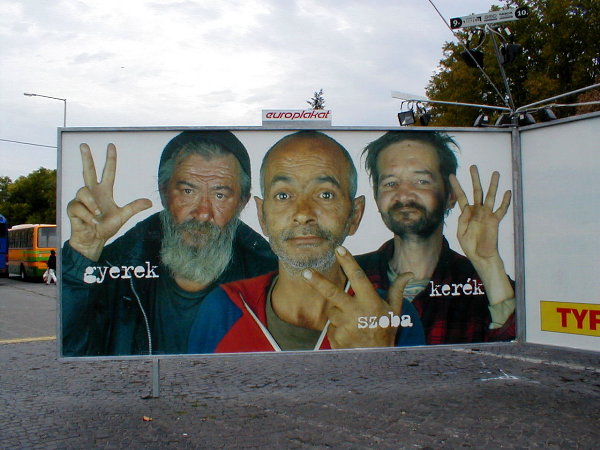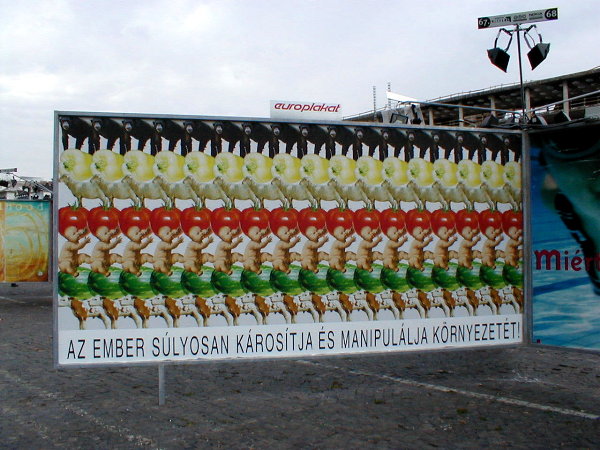
In August and September there was an exhibit of about 50 advertising billboards in the City Park of Budapest. The topics included advertisements for real products, public service announcements and social commentary. Here are four of my favorites:

This was a campaign slogan of the FIDESZ party during the 1998 elections. They won a majority in Parliament by appeal to the sensibilities of the nascent Hungarian middle class.
The FIDESZ message: A family should have three children so that they can reverse the demographic decline that plagues Hungary (and the rest of industrialized Western Europe). As things stand now, most families can only afford to have one or two kids. Ideally, the same family should also be able to own a house or apartment with at least three rooms (ie a bedroom for mom and dad, a sitting room and another bedroom for the kids). The "Four wheels" part is pretty self-explanatory. Like America in the 1950's, the car is a sign of middle class prosperity in Hungary. In the year 2000, anybody who can afford it, drives to work.
The street people in the poster are a bald-faced satire of the FIDESZ slogan. Homelessness is pretty endemic in Budapest and other large cities. Plus, the social safety net has started to show other signs of wear and tear. Pensions don't keep up with inflation and getting good medical care requires paying the nurses and doctors a "gratuity" on top of the regular bill. So a lot of people feel pretty insecure, even if at the same time they aspire to the middle class ideal that FIDESZ espouses.
The realities of poverty in Eastern Hungary and many districts of Budapest, make the FIDESZ slogan look kind of trite. Its hard to talk about everyone owning a car and a big house when alcoholism runs at around 10% of the population (and the rate is much higher for men). A significant part of the population can't afford to eat much or heat their house in winter. No doubt in the next election, this slogan will come back to haunt FIDESZ, just like "No new taxes," haunted the other George Bush.
After a decade of "transition" from State Socialism to Neo-Liberal Capitalism, Central Europe is starting to look a lot like the rest of Europe and North America. In Hungary there has been a huge expansion of the service sector. Most new jobs that pay a decent wage involve sitting in front of a computer all day. So many of the younger Hungarians have quit smoking and started going to gym. Like their american counterparts, they have to "work out," because their labor does not involve physical activity.
This paradox is especially interesting in Hungary, because of the structure of the economy. Labor is really cheap here, so ditch digging is still a profession. When they install new pipes and utility conduits under the sidewalk, its done by a crew of 20 guys with shovels and picks. The concrete or macadam is also mixed and poured by hand. All this was mechanized in the US twenty years ago. So Hungary is still stuck between two worlds: the high tech of the Silicon Valley and the manual labor of 1970's state socialism.

This is one for all you Bruno Latour fans out there. (You know who you are.) The title of this one is based on the warning label printed on all the cigarette ads in Hungary, "A dohányzás súlyosan károsítja az ön és környezete egészségét!" (Roughly translated: Smoking seriously damages you and your neighbors' health.)
So have any of you made your plans for "y3k" yet? This is a picture to file under the category, "The more things change the more things stay the same." One of the more important summer rituals in Hungary is the family pig slaughtering. The extended family all drives out to the ancestral village in the countryside and selects a pig to be killed and roasted. Usually this involves a lot of palinka, the local firewater made from plums. Some folks view this as an atavistic survival from a long gone age. Other people see it as a continuation of authentic Hungarian folk traditions. Its hard to say who is right on this one. The closest thing we have to this event in America would be Thanksgiving Dinner, with all its attendant rituals and recapitulation of traditional gender roles. The caption on the poster reads something like, "Place- Bacska Pista's backyard; Time - August 18th 3000; Participants: DJ Pista, DJ Balint, DJ Domi, DJ Csaba." I guess the artist figures both Techno and Agro will be around for a long time to come.